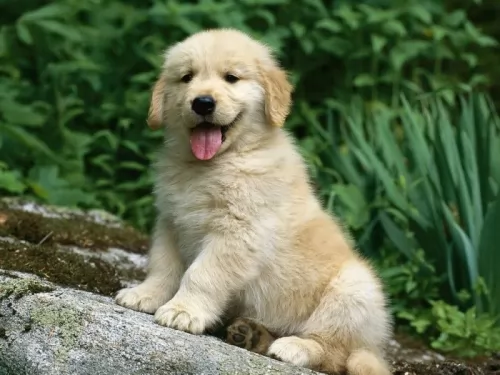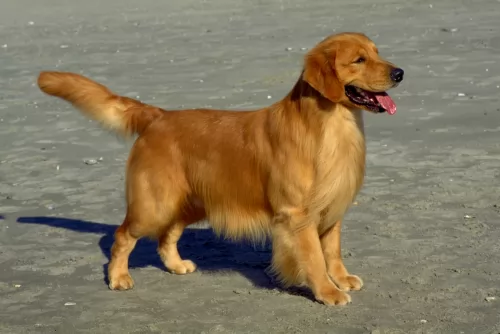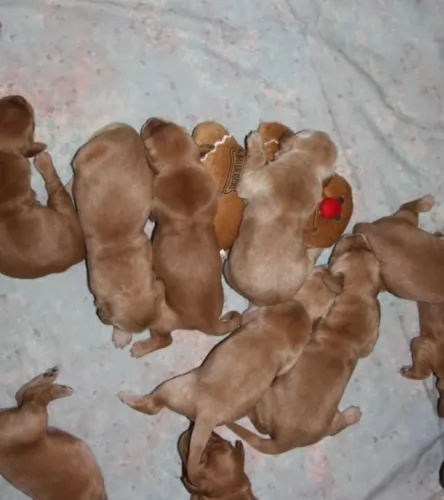 Petzlover
Petzlover Golden Retriever is originated from United Kingdom but Large Munsterlander is originated from Germany. Both Golden Retriever and Large Munsterlander are having almost same height. Both Golden Retriever and Large Munsterlander are having almost same weight. Both Golden Retriever and Large Munsterlander has almost same life span. Both Golden Retriever and Large Munsterlander has same litter size. Both Golden Retriever and Large Munsterlander requires Moderate Maintenance.
Golden Retriever is originated from United Kingdom but Large Munsterlander is originated from Germany. Both Golden Retriever and Large Munsterlander are having almost same height. Both Golden Retriever and Large Munsterlander are having almost same weight. Both Golden Retriever and Large Munsterlander has almost same life span. Both Golden Retriever and Large Munsterlander has same litter size. Both Golden Retriever and Large Munsterlander requires Moderate Maintenance.
 The Large Münsterländer hails from the Münster region in Germany. It was in 1919 that the first breed club was founded.
The Large Münsterländer hails from the Münster region in Germany. It was in 1919 that the first breed club was founded.
The dog’s ancestors were different Spaniel breeds as well as the German Longhaired Pointer. The dog quickly became a sought after hunting dog in Europe.
The Large Munsterlander Association of America is the only official breed organization for this dog. The dog was recognized by the United Kennel Club in 2006.
 The Golden retriever always gets in the top ten ranking in USA. They are very intelligent and beautiful. Also they are very active and they take more years to mature as they like being silly and playful. Up-to four years they seem to play like a puppy. As the breed is set in for hunting waterfowl and ducks, they need a regular exercise such as walking or running. They love to roam in the yard and run in the beach.
The Golden retriever always gets in the top ten ranking in USA. They are very intelligent and beautiful. Also they are very active and they take more years to mature as they like being silly and playful. Up-to four years they seem to play like a puppy. As the breed is set in for hunting waterfowl and ducks, they need a regular exercise such as walking or running. They love to roam in the yard and run in the beach.
They love to be always with his master and so it will be inside the home. They can be involved in doing regular home activities. Their characteristic is not to be a watchdog, as it barks when a stranger comes and after that they love to make friendship with him. They don't like to spend time alone and hence love to make new friends. When you think of buying a golden retriever puppy you should check whether the breeder is a reputable breeder.They must be well trained for a good result. When bringing it to many different areas they will gain more knowledge and intelligence. The nails can be trimmed at a regular interval which will be good for the foot of your dog.
 The medium to large Large Munsterlander stands between 60 to 65cm at the withers and weighs about 28 to 32kg.
The medium to large Large Munsterlander stands between 60 to 65cm at the withers and weighs about 28 to 32kg.
When you look at him, you get the feeling that you’re looking at a springer spaniel. He has long broad feathery ears and also a long feathery tail. The head is fairly broad and somewhat rounded.
The coat of the dog is long and dense, and is quite wavy with feathering around the legs and tail. He can be black and white or be a reddish brown with patches or ticking because of the piebald gene. If you allow your Large Munsterlander to become a parent, the average litter of this dog is 5 to 10 puppies.
The Large Munsterlander is essentially a tracking, retrieving dog. He makes an excellent hunting dog and these instincts are strong within this particular breed. It is why some breeders only give their puppies to serious hunters.
He is an active dog, and because he loves to retrieve, ball games will suit him down to the ground. Take him with you on your walks as he is a naturally athletic, active dog.
He loves water too and won’t need a second invitation from you to jump right into dams or pools. He is such an easy going dog, getting on well with children and pets in the home and being a good first choice for first time dog owners too. However, he requires plenty of exercise.
Because he is a hunting and retrieving dog, he will be far better suited to living in a home where there is a fair sized garden. He isn’t regarded as a city dwelling dog. These are dogs that just love to be outside and running around.
The Large Munsterlander can be a boisterous dog, so teaching him some basic commands such as ‘come, stay, lie-down, sit or heel’ will improve the way he behaves inside the home and when in the company of other people.
Training and socialization will do him the world of good and it means you can take your dog anywhere – he’ll always be well behaved, becoming a calm, gentle dog.
 They love so much to play and spend time with children.
They love so much to play and spend time with children.
The Golden retriever has a good energy which helps them to be a great hunting dog.
They have a high sensitivity level and will enjoy moderate weather. They don't like apartment life as they love to roam freely and explore new areas.
They also have a high intelligence and so learns tricks very quickly. They love to hold something in mouth and run.
 As a sporting dog, the Large Munsterlander loves his exercise. You can involve him in all kinds of outdoor activities, and he’ll readily join in, from swimming, to hiking to ball games to just plain running for the fun of it.
As a sporting dog, the Large Munsterlander loves his exercise. You can involve him in all kinds of outdoor activities, and he’ll readily join in, from swimming, to hiking to ball games to just plain running for the fun of it.
Always be careful with puppies though, before you involve such a young dog with such strenuous exercise. For a better chance of avoiding hip dysplasia, it is better to wait till he is about 12 months old before you involve him in too many lively activities.
He’s an easily trainable dog too, and the fact that he is a calm, gentle dog who is loving and loyal makes him an excellent pet choice.
 As the golden retriever gains weight very easily, they should not be overfed. They are prone to get cancer, hip dysplasia, heart problems, eye defects and skin allergies.
As the golden retriever gains weight very easily, they should not be overfed. They are prone to get cancer, hip dysplasia, heart problems, eye defects and skin allergies.
The golden retriever sheds hair profusely. The shedding can be reduced by brushing 3 times a week as it will remove the dead hair.Mild shampoo containing omega 3 and omega 6 fatty acids must be used so that it will prevent hair fall and provides healthy skin and fur. The hair can be trimmed but it should not be shaved as the pet will get problems during winter. Adding a drop of olive oil in the dog food will reduce shedding.
 All dogs can develop some health problems no matter how healthy they are, but when they are happy dogs, they’re well fed, exercised and loved, they have a better chance of reaching a ripe old age.
All dogs can develop some health problems no matter how healthy they are, but when they are happy dogs, they’re well fed, exercised and loved, they have a better chance of reaching a ripe old age.
Large Munsterlanders are generally healthy dogs. Some conditions reported in the breed which are highly unlikely to affect your dog, but are good knowing about are hip dysplasia, cataracts and osteochondrosis.
This is a common condition where the joints of quickly growing puppies are affected. The surface of the joint doesn’t convert into bone in certain areas. The result is thickened cartilage which detaches from the surrounding normal cartilage, forming a flap.
Osteochondrosis causes the development of osteoarthritis, affecting certain joints of the dog. Both genetics and the wrong diet are causes of osteochondrosis.
It isn’t always possible to feed your dog wholesome food, but always try to get the very best quality food there is. Also, don’t allow your young Large Munsterlander to be involved in strenuous exercise before he reaches one year of age. Pounding around can put abnormal weight on the joints which can spell problems when the dog is older. Osteochondrosis mostly affects large and giant breed dogs.
 The puppy should be fed 3 times a day and it should be morning 7 and noon and evening within 6. They should not be fed after 6pm and should not be given water after 7pm as to make them a perfect watchdog. Peas, potatoes and flaxseed provide nutrition for them. Chicken fat is good for their skin. Chicory root and chelated minerals are good for their health.
The puppy should be fed 3 times a day and it should be morning 7 and noon and evening within 6. They should not be fed after 6pm and should not be given water after 7pm as to make them a perfect watchdog. Peas, potatoes and flaxseed provide nutrition for them. Chicken fat is good for their skin. Chicory root and chelated minerals are good for their health.
The Golden retriever can be fed by normal nutritious and proteins content food as they will gain much energy for them.
As the golden retriever has chances of getting bone problems they should not overfed.
They are having high energy levels and hence they require playing for 2 hours daily. The breed was set in for sporting and hunting and so it likes to play, run and jog.
 The Large Munsterlander puppy will require 4 meals a day. When he reaches a year of age, you can give him two smaller meals a day.
The Large Munsterlander puppy will require 4 meals a day. When he reaches a year of age, you can give him two smaller meals a day.
He is a large, active dog and if you feed him manufactured dog food, make sure its high quality and that it caters to his age and energy levels. His dry kibble can be mixed with cooked chicken, brown rice or pasta and cooked or raw vegetables occasionally.
Raw meat can be expensive, but every dog requires some raw meat in the diet every now and then. Without some raw meat, you dog may well suffer with skin problems and a dull coat.
If your dog is still an active hunting dog, a high fat, high protein diet will be good for him. When in any kind of doubt, speak to a dog expert or your vet about how to feed him for health and longevity.
As a sporting hunting dog, the Large Munsterlander has high exercise needs. He most certainly won’t do well in a tiny city garden as he is an outdoor dog wanting to be running and exercising. If you choose this particular dog breed, make sure that you take him on walks, allow him off his leash in the park, play ball games with him and take him with you when you go on hikes.
With his silky coat, you want to be brushing your pet twice a week. If he has been out hunting with you, while brushing him, check for twigs, grass and burrs tangled in the hair.
Other basic care includes trimming the nails, keeping the ears clean and dry inside, brushing the teeth with a canine-approved pet toothpaste and toothbrush for good overall health.